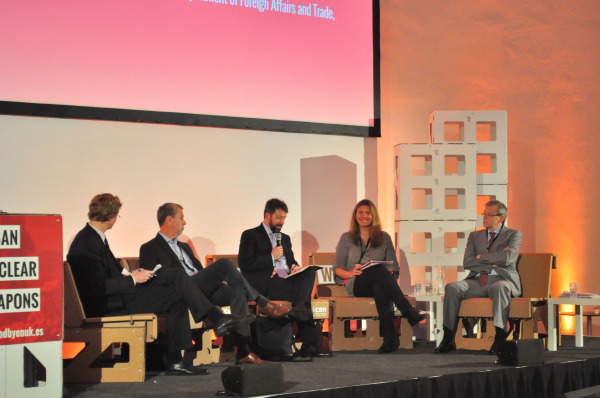The second day of the civil society forum started with a panel on the theme of political leadership which involved representatives from those countries which have organised inter-governmental conferences speaking about the things achieved to date in the process of this humanitarian approach to disarmament.
Gry Larsen from Norway, a former State Secretary of Norway, explained her experience in different disarmament processes since 2005 and explained how humanitarian perspectives on disarmament issues have changed the discourse. The methodology of bringing together UN agencies, civil society and States has worked in other cases and Norway decided to apply this to nuclear weapons.
Within three years of the Oslo process for cluster munitions starting there was a treaty.
Larsen explained that the aim of the Oslo conference in 2013 was to create a forum in which a fact-based approach could be used, presenting the latest scientific research and historical evidence of what nuclear weapons do in the short, medium and long-term.
It was concluded in that first conference that it is impossible for any country to build the response capacity needed to cope with a nuclear weapon detonation.
Jorge Lomónaco, representing Mexico in disarmament forums in Geneva, said that the best way for Mexico to achieve security is via disarmament.
He explained how the number of participating countries grew to 140 from 128 in Oslo. The discussions moved on to tackle the problems of risk of accidental use, the lack of constraints of the effects of nuclear disruption at national borders, the fact that the people most affected would be the poorest in society and that economic development would be set back decades.
The final declaration of the chair in Mexico appealed for urgent action to start disarmament negotiations, calling it a point of no return.
In the opinion of the speaker the legacy of the humanitarian approach has been; to give a voice to non-nuclear states who until now have been patiently waiting for the nuclear states to do something; a change in the way the subject is tackled, moving from an emotional approach to a more rational basis using science and facts; the realisation that the position of states in favour of nuclear disarmament in principle but who refuse to take any steps towards this goal in practice is clearly inconsistent.
Jan Kickert, from the Austrian Ministry for Europe, set out Austria’s tradition of engagement in all disarmament processes, referring to Austria’s location as a neutral State on the border of the Iron Curtain during the cold war, Austria knew themselves to be a potential target in the case of a nuclear conflict. He pointed out that while any country has these weapons other countries will also want them but echoing previous speakers, agreed that the humanitarian approach changes the narrative in disarmament discussions. It has the potential to break the nuclear stalemate in the NPT process where P5 countries are effectively modernising their weapon systems and creating a new arms race.
With 160 countries registering for this third edition of the conference it is clear that this approach is making headway and that pressure is being put on the nuclear weapons states.
In a question concerning the participation of the UK and the USA for the first time in this series of conferences, their presence was welcomed by the speakers, who rejected previous accusations by the P5 members of the Security Council that this process undermines the NPT process.
Lomónaco summed up the situation. “It’s like smoking! There’s never a good time to quit until that moment arrives.”
Let’s see if the nuclear weapons states can be convinced to kick their nasty habit over the next two days. Even if not all of them are here, for sure they will be avidly watching to see the results and will notice the increasing dissatisfaction of non-nuclear weapons states with the NPT process. May 2015, and the NPT review conference in New York, is rapidly approaching. States in this humanitarian approach will be expecting more than just the same rehashed words and broken promises from previous cycles.










